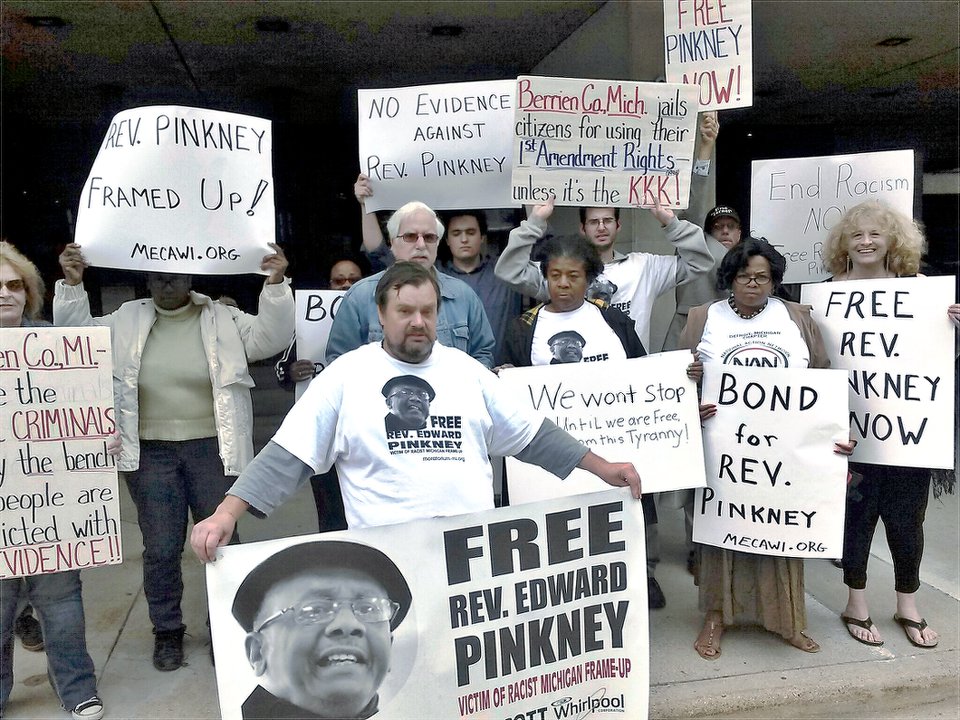

Supporters of Rev. Edward Pinkney demonstrate in Grand Rapids, Mich., demanding he be released on bond.
Marquette Branch Prison, Mich. — A three-judge panel of Michigan’s Court of Appeals will hear oral arguments in the case of political prisoner the Rev. Edward Pinkney on May 11. Rev. Pinkney has already served 17 months in prison following his conviction in December 2014 in Berrien County on the western end of Michigan.
Rev. Pinkney’s attorney, Tim Holloway, filed an appeal in September 2015. The American Civil Liberties Union and the National Lawyers Guild then submitted amicus briefs supporting the appeal.
On April 15, this writer drove almost 500 miles north from Detroit to visit Rev. Pinkney in Marquette Branch Prison. He was in good spirits and looking forward to having his case heard. “If there is any justice, any attention to the facts and the law, I will win this appeal,” he said. But he was also very aware that justice is often a rare commodity in the court system.
Pinkney had led a recall campaign against then Benton Harbor Mayor James Hightower, in 2014, gathering and turning in more than enough signatures. Taking his wife out of town for her birthday on April 24 he got a call from friends. “They told me that my house was surrounded by police with automatic weapons and armored vehicles,” Rev. Pinkney said. Several days later, he turned himself in to face charges that five dates on the petitions appeared to have been altered!
During his trial for five counts of felony forgery it came out that there was no evidence connecting Pinkney to the alleged changes. No witnesses, no handwriting testimony, no confession and no chain of custody implicated him.
The all-white jury was told by the prosecutor and the judge, “You don’t need evidence to convict Pinkney.” They were instructed that evidence that Rev. Pinkney had led the movement, spoke at press conferences and organized peaceful protests was enough to show he had the most to gain from the alleged alterations. Convicted, Rev. Pinkney was sentenced to 2.5 to 10 years. Judge Schrock said he was going to “make an example” of Rev. Pinkney.
Life inside prison has been hard and stressful on this 67-year-old political prisoner. On Oct. 6, 2015, he was transferred from Lakeland Correctional Facility, just a few hour’s drive from his home, to Marquette Prison in Michigan’s Upper Peninsula. As a practical matter, this drastically cut the number of visits he could receive from family and friends. Rev. Pinkney immediately faced threats and harassment from the remote prison’s guards.
At the end of October, his telephone privileges were cancelled for six months. He faced verbal and physical threats daily. Over the months, Rev. Pinkney was “ticketed” for “having a Bible on his bed,” “having too many legal documents in his cell” and “smuggling,” among other bogus charges. He was able to beat many of these charges at internal prison hearings.
Fearing for his life, his supporters held an “Emergency Conference to Save Rev. Pinkney” in Detroit in December 2015.
A national campaign flooded Michigan Gov. Rick Snyder’s office and Department of Corrections Director Heidi Washington’s office with phone calls and letters demanding safety for Rev. Pinkney. Several state senators and representatives got their legislative corrections ombudsman, Keith Barber, to make official inquiries.
The Court of Appeals will meet in Grand Rapids, Mich., on May 11 to consider whether to uphold or overturn Rev. Pinkney’s conviction after hearing short oral arguments that supplement the lengthy legal briefs. The ACLU brief focuses on the unconstitutional prosecution of Rev. Pinkney for engaging “in the political and civic life of his community. In addition, his trial was tainted by improper references to his controversial, but lawful First Amendment activities” (ACLU brief, p.2).
The original prosecutor was allowed to argue that Pinkney “was an outspoken critic of the Harbor Shores development, the Senior PGA [golf course built on land taken from a public park], Whirlpool. He has T-shirts with judges’ names on them described as ‘crimes against humanity.’ He’s a minister of the people. He’s brought Hollywood celebrities to town; Jesse Jackson.”
The ACLU urges the appeals court that “a citizen should not be concerned that his or her unpopular political views will be accepted by a court as the basis for criminal liability. Yet, the prosecutor was permitted to argue during closing that Rev. Pinkney’s protected political speech somehow made him more likely to commit a crime” (ACLU brief, p.7).
Supporters of Rev. Pinkney are planning to come from around the state to fill the courtroom during the May 11 oral arguments.
Raposo is a Portuguese Marxist analyst, editor of the web magazine jornalmudardevida.net, where this article…
By Alireza Salehi The following commentary first appeared on the Iranian-based Press TV at tinyurl.com/53hdhskk.…
This is Part Two of a series based on a talk given at a national…
Educators for Palestine released the following news release on July 19, 2025. Washington, D.C. Educators…
On July 17, a court in France ordered the release of Georges Abdallah, a Lebanese…
The following are highlights from a speech given by Yemen’s Ansarallah Commander Sayyed Abdul-Malik Badr…